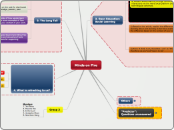Correlation Features:
Subtopic
Cultural mindset
The United States Mindset on Family
Assessment
Possible Misconceptions
Over-generalization:
Under-generalizations:
Defining Feature:
Prototype:
Non-Examplars:
Mindset
Having a positive/growth mindset affects success and learning in the classroom
Developmental Attributes
Students between the ages of 10 and 14
Relevance to prior Knowledge
Helping students draw connections to their life can be an effective tool for creating strong links between knowledge and a new understanding.
Attention Span
10 to 15 minutes of activity with no changes in the activity.
Interests
Students interests: Experimenting, Social interactions, References to former knowledge.
Gender Neutral Trends
Vygotskian considerations
Begin with self talk and progress to internalization. Differentiate Scaffolding.
Piagetian developmental level
Blend of Concrete operations and Formal Operations
Gender
Female
Activities focused around social interactions and skills. Activities that have reason and help to increase student participation.
Male
Activities focused on student engagement. Activities with a focus on Competition, movement, and rewards.
Cross-Curricular Ties
Social Studies: explore different cultural focuses/mindsets e.g. family, career, education, military
Mathematics: problem solve, play with puzzles, understand that what you don't understand now will come to you eventually
Science: experimentation/ new discovery
Language Arts: The power of ideas in Literature that help formulate new understanding and growth.
Health: positive body image and regular exercise









